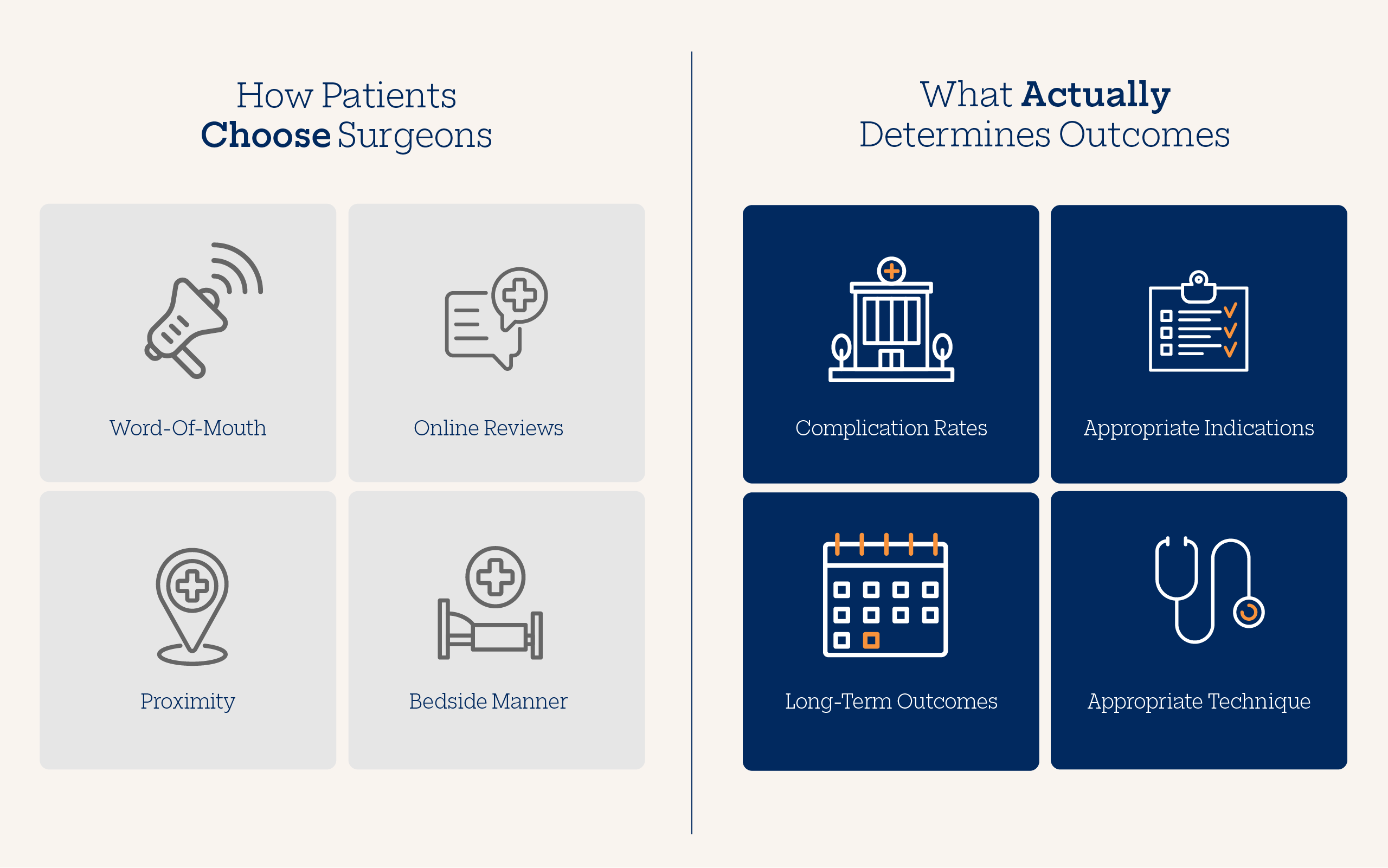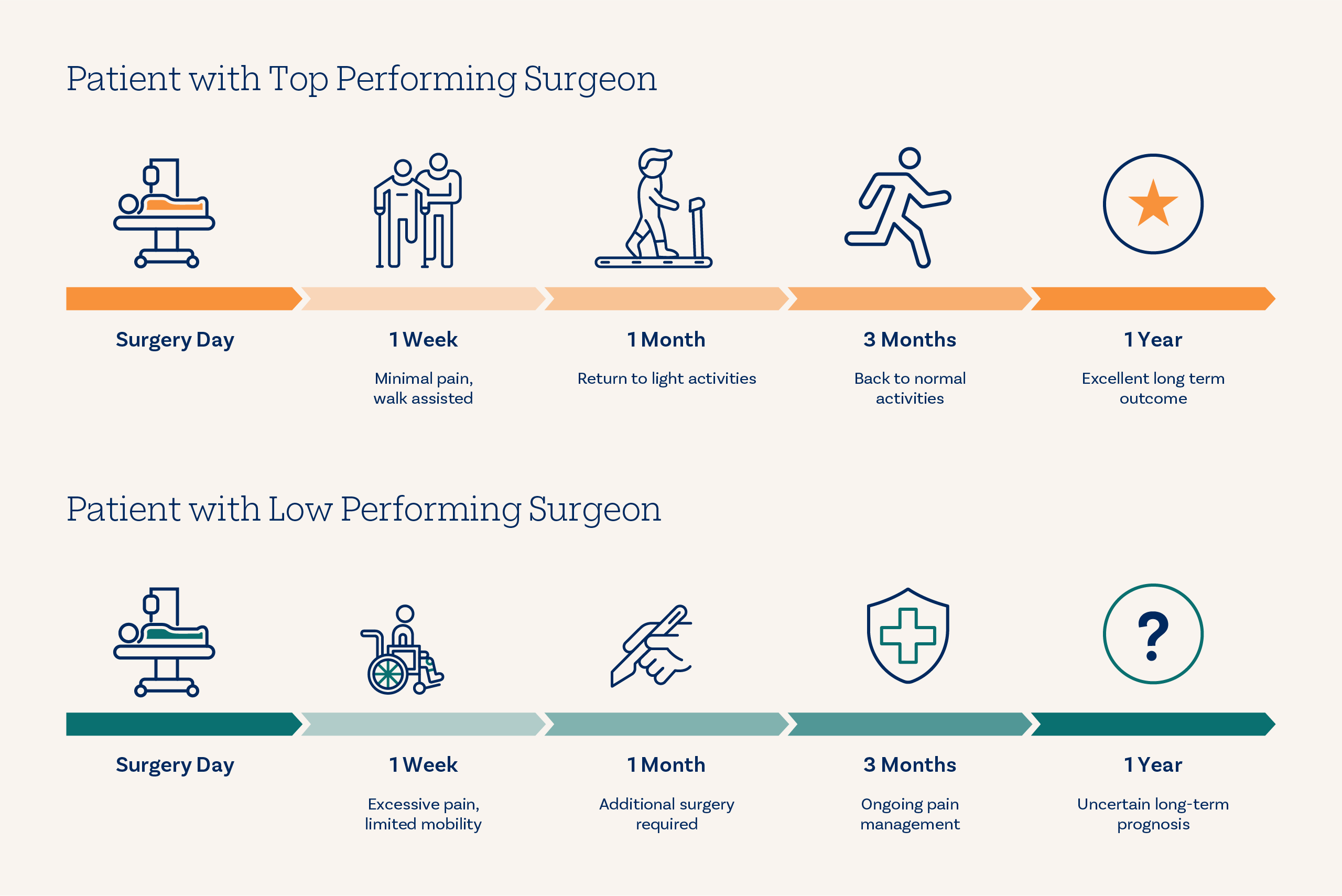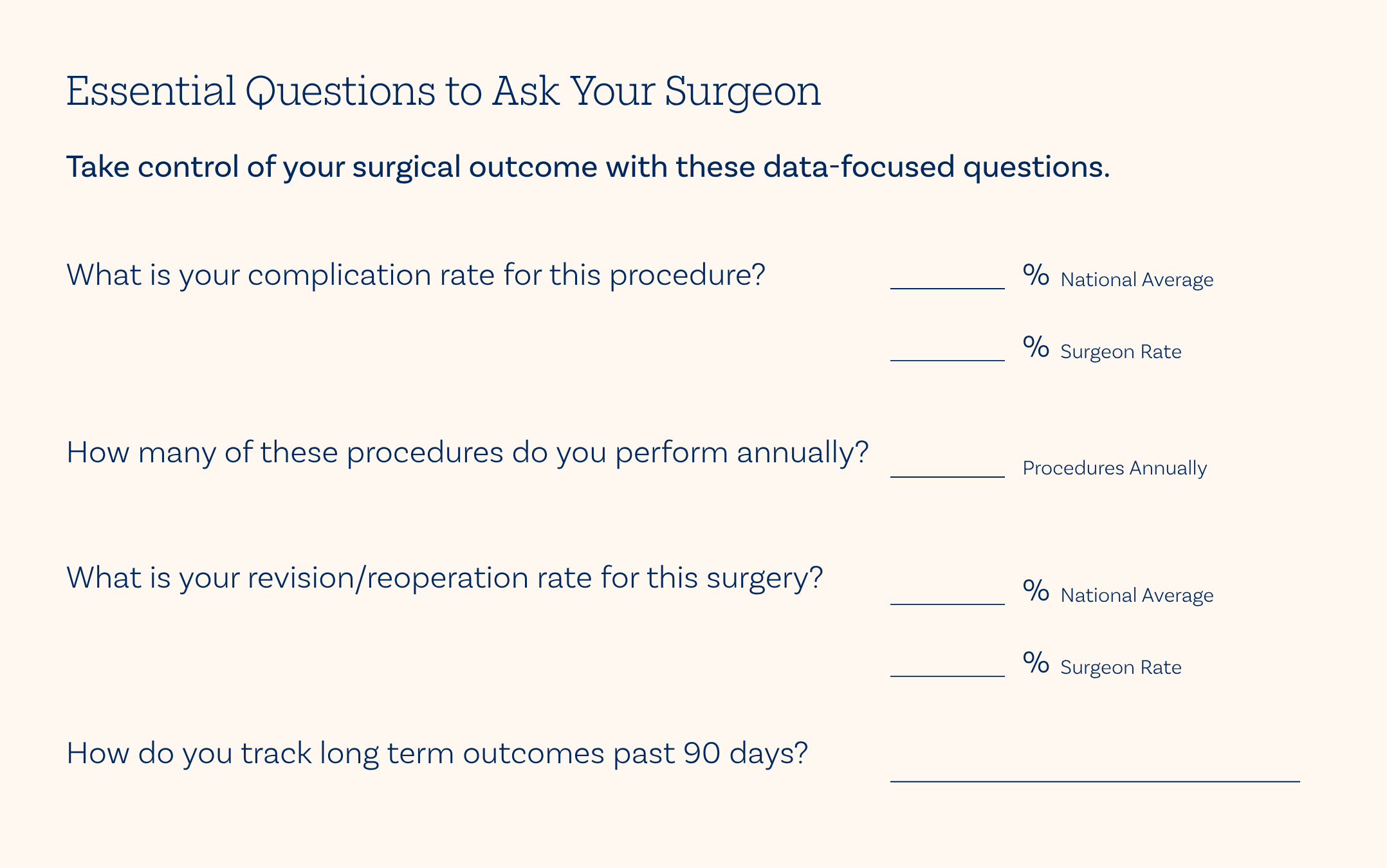Imagine making one of the most important decisions of your life—one that could determine whether you recover quickly or suffer complications for years—without having access to the most critical information. That’s exactly what happens when you choose a surgeon based on common methods like word-of-mouth recommendations, online reviews, or hospital affiliations.
The Truth About Surgeon Performance
Here’s what most patients don’t realize: the variation in surgeon performance for the exact same procedure can be dramatic.
Research shows that complication rates can vary significantly between different surgeons performing identical operations, with some studies showing up to an 8-fold difference between top and low-performing surgeons.¹

For procedures like hip and knee replacements, studies reveal that complication rates can range from less than 1% with top-performing surgeons to over 10% with lower-performing ones.2 This isn’t just a minor difference—it can mean the difference between a successful outcome and a life-altering complication.
How Patients Currently Choose Surgeons (And Why It’s Not Working)
Most patients select their surgeons through methods that tell them almost nothing about what really matters:
- Word-of-mouth recommendations from friends or family (72% of patients rely on this method)3
- Online reviews that focus on bedside manner and office experience, not surgical outcomes4
- Primary care physician referrals often based on personal relationships or network affiliations
- Hospital websites that list all surgeons without outcome data
- Insurance directories that prioritize network participation over quality

The problem? None of these methods provide objective data on a surgeon’s actual performance with specific procedures. It’s like choosing a pilot based on how friendly they are at check-in, rather than their safety record.
The Information Gap That Puts Patients at Risk
This information gap exists for several key reasons:
- Outcome data isn’t easily accessible to the public
- Patients don’t know which quality metrics matter for their specific procedure
- Short-term complication tracking fails to capture long-term issues
- Subjective rating systems focus on patient experience rather than surgical outcomes
- Conflicts of interest in referral systems prioritize keeping patients “in network” rather than finding the best surgeon
Meanwhile, studies show that complications after surgery can lead to extended recovery times, additional surgeries, chronic pain, disability, and even death. The stakes couldn’t be higher.
What Really Determines Surgical Success
While many factors influence surgical outcomes, research consistently shows that your choice of surgeon is among the most significant. At SurgeonCheck, we’ve identified four key categories that determine surgical success:
1. Appropriate Indications – Whether the surgeon correctly identifies when surgery is needed and chooses the right procedure for your specific condition
2. Complications Management – The surgeon’s track record for preventing and managing complications during and after surgery
3. Best Method Selection – Whether the surgeon chooses the most effective surgical technique and approach for your particular case
4. Long-term Outcomes – The surgeon’s ability to deliver lasting results that improve your quality of life over years, not just months
These surgeon-specific factors matter more than:
- The hospital where the surgery is performed
- The brand of surgical implant used
- Many patient demographic factors
- The latest surgical technology
In fact, the variation between surgeons’ performance in these four categories often exceeds the variation between hospitals or surgical techniques.
The Real-World Impact
Consider this real-world example: Two patients with identical knee problems undergo the same procedure—one with a surgeon in the top performance tier, and one with a surgeon in the bottom tier. The first patient is back to normal activities within weeks, while the second develops an infection requiring additional surgery and faces chronic pain for years afterward.

This scenario happens daily across the country—not because of bad luck, but because patients lack the data to make informed decisions about their surgeons.
What Patients Can Do
While the healthcare system catches up to provide more transparency, there are steps you can take to protect yourself:
- Ask about procedure-specific complication rates when interviewing potential surgeons
- Seek out surgeons who specialize in your specific procedure, not just general practitioners
- Request information on long-term outcomes beyond the standard 30-90 day window
- Consider data-driven platforms that analyze surgeon performance objectively, like SurgeonCheck
- Don’t rely solely on reputation or convenience when making this critical decision

Print this checklist to bring to your surgeon consultations. Asking these specific questions can help you make a more informed decision about your surgical care. You can also search for top-performing surgeons by clicking the button below.
The Path Forward
At SurgeonCheck, we believe patients deserve better. That’s why we’re working to close this information gap by providing access to objective, data-driven surgeon recommendations based on actual performance measures—not subjective reviews or network affiliations.
By analyzing millions of patient outcomes across more than 100 million procedures, we identify surgeons who consistently deliver superior results for specific procedures. Our evaluation looks beyond the typical 30-90 day window to track complications that may emerge years later.
Unlike many competing solutions that allow surgeons to pay for placement or enhanced listings, SurgeonCheck never accepts payment from surgeons to be recommended, ensuring truly unbiased evaluations.
Take Control of Your Surgical Outcome
Your choice of surgeon is too important to leave to chance or incomplete information. Take the first step toward a better surgical outcome by learning more about your procedure’s success factors and how to identify surgeons who excel at the specific operation you need.
Learn More About Your Procedure’s Success Factors →
References
- Variable impact of complications in general surgery: a prospective cohort study. PMC. https://pmc.ncbi.nlm.nih.gov/articles/PMC3364303/
- Can Total Joint Replacement Complication Rates Be Reduced? Johns Hopkins Medicine. https://www.hopkinsmedicine.org/news/articles/2023/02/can-total-joint-replacement-complication-rates-be-reduced
- Report: 72% of patients choose a physician based on word of mouth. Becker’s Hospital Review
- The Credibility of Physician Rating Websites: A Systematic Literature Review. ScienceDirect
- Online Scorecard Shows Surgeons’ Complication Rates. Medscape Medical News. https://www.medscape.com/viewarticle/848050
- Surgical Skill and Complication Rates after Bariatric Surgery. New England Journal of Medicine. https://www.nejm.org/doi/full/10.1056/NEJMsa1300625
- How Good Is Your Surgeon? Now You Can Look It Up. Healthline. https://www.healthline.com/health-news/how-good-is-your-surgeon-now-you-can-look-it-up-071515
- Rates and outcomes of primary and revision total hip replacement in the United States medicare population. PubMed. https://pubmed.ncbi.nlm.nih.gov/12533568/
- Total Hip Replacement – OrthoInfo – AAOS. https://orthoinfo.aaos.org/en/treatment/total-hip-replacement/


